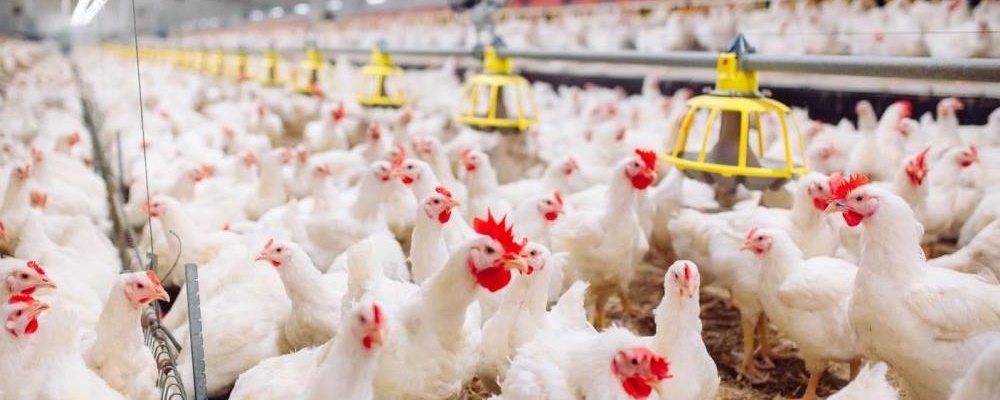
Newcastle disease outbreak contained, government says
Jul, 26, 2024 Posted by Gabriel MalheirosWeek 202430
The federal government informed the World Organization for Animal Health (WOAH) and importing countries of Brazilian poultry on Thursday that it successfully contained the Newcastle disease outbreak in Rio Grande do Sul.
Surveillance efforts will continue around the property in Anta Gorda, Rio Grande do Sul, where the case was confirmed last week. The Ministry of Agriculture will also investigate the potential causes of the outbreak and monitor the slaughter and disposal of poultry from the 49 commercial farms within a 10-kilometer radius of the eradicated outbreak.
Carlos Goulart, secretary of agricultural defense at the Ministry of Agriculture, anticipates that the swift response of the Brazilian health service to identify, contain, and eliminate the virus from the commercial flock will expedite the normalization of poultry product exports.
Importers are being updated daily on the case’s progress. New suspected outbreaks were ruled out this week, the emergency area has been reduced, and the scope of restrictions has been revised.
“The conclusion of the outbreak provides robust data that we will present to countries, proving that we are free of Newcastle disease and can resume certification,” Mr. Goulart told Valor.
The containment was achieved just a week after the case was confirmed on July 17. Samples were collected on July 9 and sent to the Federal Agricultural Defense Laboratory (LFDA) in Campinas, São Paulo. The outbreak conclusion deadline is 21 days.
With the outbreak eradicated, proving the absence of the virus over the next 90 days is necessary for WOAH to declare the country free of the disease again. However, the resumption of export flows does not depend on the official return of this status; it relies solely on the importing countries’ decisions.
Cautiously, the secretary refrained from estimating a timeline for the complete resumption of external sales.
Major clients such as China and Mexico continue to impose restrictions across the entire country. The ministry’s trade area, along with agricultural attachés based in these countries, is expected to adopt specific strategies to facilitate the resumption of trade as quickly as possible, according to Mr. Goulart.
“The source of the outbreak is eliminated, and there was no spread. This helps us accelerate the timeline to conclude all activities and return to the previous health status,” said Marcelo Mota, director of the department of animal health. “The Brazilian commercial poultry production system was not compromised. This is a localized situation.”
The ministry will continue investigating potential causes of the outbreak. The virus is common in pigeons, and extreme weather events in the region may have contributed to contact between commercial poultry and infected wild birds or their secretions. “One possible cause is a breach in biosecurity at the farm. The most likely scenario is an external source,” said Mr. Goulart.
The ministry has ruled out the possibility that the disease was introduced through earlier links in the poultry chain, such as hatcheries and breeding, and confirmed that the virus did not spread.
Within the 10-kilometer radius of the outbreak, there are 49 commercial farms—two of which are breeding farms. Poultry housed in these establishments—between 12,000 and 15,000 birds per farm—will be slaughtered in regional slaughterhouses under government supervision. The meat must undergo thermal treatment and can be sold domestically or internationally, but not in its raw form.
The Emergency Zoosanitary Operations Center (CoeZoo), comprising federal and state officials, will issue Animal Transit Guides (GTA) for the properties to monitor the movement of animals from the municipalities of Anta Gorda, Ilópolis, Doutor Ricardo, Putinga, and Relvado. There are no slaughterhouses within this perimeter, so the birds will be slaughtered in Marau and Lajeado.
The birds will receive special inspection attention at the slaughterhouses. “With the GTA, we have an advance notice mechanism for the establishment to prepare, receive the birds, and keep them segregated, without contact with others,” said Director Marcelo Mota. He emphasized that the region is considered clean and free of the disease, but depopulating the farms and monitoring the final product is an additional safety measure.
José Eduardo dos Santos, president of the Rio Grande do Sul Poultry Association (ASGAV), said that the sector can store the production blocked for export over the past week but noted that the easing of restrictions provides relief for the industries. “We are within our capacity. If it took longer, things would worsen. The trend is to gradually regularize so that there are no significant impacts,” he said.
This storage capacity was under pressure, said Carlos Goulart. “We believe we managed to mitigate the commercial impact without causing a severe production storage crisis. The poultry chain is the most sensitive to commercial flow interruptions.”
Source: Valor Econômico International
Click here to access the original story: https://valorinternational.globo.com/agribusiness/news/2024/07/26/newcastle-disease-outbreak-contained-government-says.ghtml
-
DW 2020 EN
Apr, 12, 2021
0
DatamarWeek 13 April 2021
-
Economy
May, 02, 2022
2
DataLiner: Brazilian container handling data from March indicate a stagnant economy
-
Ports and Terminals
Mar, 07, 2023
0
Audit court brings Port of Santos privatization back to debate
-
Automotive
Oct, 07, 2020
0
ANFAVEA forecasts 34% drop in vehicle exports in 2020

